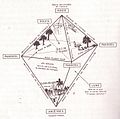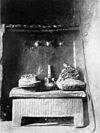Introduction The beliefs and practices of African people are highly diverse, and include various ethnic religions. Generally, these traditions are oral rather than scriptural and are passed down from one generation to another through narratives, songs, and festivals. They include beliefs in spirits and higher and lower gods, sometimes including a supreme being, as well as the veneration of the dead, use of magic, and traditional African medicine. Most religions can be described as animistic with various polytheistic and pantheistic aspects. The role of humanity is generally seen as one of harmonizing nature with the supernatural. (Full article...) Selected article'Divination (from Latin divinare "to foresee, to be inspired by a god", related to divinus, divine) is the attempt to gain insight into a question or situation by way of an occultic, standardized process or ritual. Used in various forms throughout history, diviners ascertain their interpretations of how a querent should proceed by reading signs, events, or omens, or through alleged contact with a supernatural agency. Divination can be seen as a systematic method with which to organize what appear to be disjointed, random facets of existence such that they provide insight into a problem at hand. If a distinction is to be made between divination and fortune-telling, divination has a more formal or ritualistic element and often contains a more social character, usually in a religious context, as seen in traditional African medicine. Fortune-telling, on the other hand, is a more everyday practice for personal purposes. Particular divination methods vary by culture Selected imagesFestivalsThere are several religious festivals found in the various Traditional African religions. Some of these are listed below next to their corresponding religion :
Selected biography
The King of Oussouye is a religious, spiritual and traditional leader of the Jola people who follow their traditional religion. The Jolas believe in a god called Ata Emit. The King is an intermediary between God and men. The king is described as a "collaborator of God who receives offerings to pray and intercede with the spirits".
Selected quote
Ram Swarup quoted in Koenraad Elst (2002) Source: Swarup, Ram [in] Elst, Koenraad, Who is a Hindu? : Hindu Revivalist Views of Animism, Buddhism, Sikhism, and Other Offshoots of Hinduism, Voice of India (2002), p. 72, ISBN 9788185990743
Did you know
Related portalsTopicsFor more Traditional African religion topics, see Category:Traditional African religions.
CategoriesWikiProjectsThings you can doAssociated WikimediaThe following Wikimedia Foundation sister projects provide more on this subject:
Discover Wikipedia using portals |






































